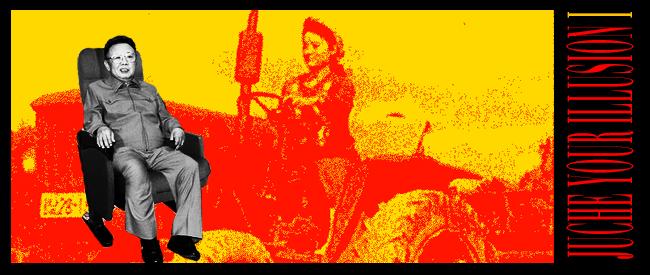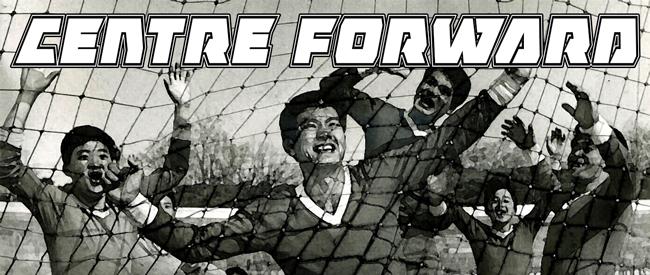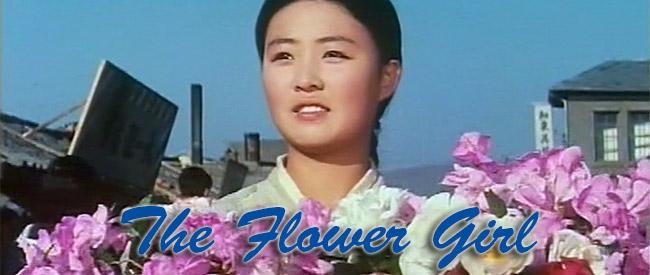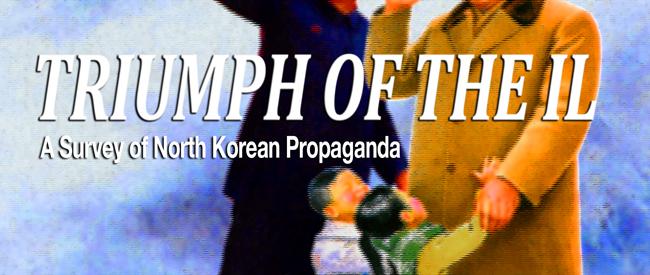
North Korea’s late Kim Jong-Il was, by all accounts, a legendary cinephile who aimed to surpass the technical and artistic standards of Moscow. He weeded out potential counter-revolutionaries, organized workshops for the studies of Kim Il Sung’s theories of culture and did in fact author the volumes of film criticism published under his byline. The films produced under his leadership engage directly with the concept of juche, a particularly North Korean form of Marxism-Leninism generally revolving around the idea of total, homegrown self-reliance; in the senior Kim Il Sung’s words: “having the attitude of master toward revolution and construction in one’s own country…using your own brains, believing your own strength and displaying the revolutionary spirit of self-reliance, and thus solving your own problems for yourself on your own responsibility under all circumstances.”
Initially working as department director of propaganda and agitation, the young Kim Jong Il instituted wide-sweeping reforms in the North Korean film industry, mandating that artists avoid both art-for-art’s sake on one extreme and stiff, dogmatic films that neglect form and artistry on the other. He then actively encouraged people to emulate the heroes from films: “Day after day, leading characters in the works of art become real in each factory and each workshop,” he wrote.
Being at once proudly insular and aspiring to the artistic achievements of great Russian filmmakers and the magic of Hollywood, North Korean film is singularly baffling, enrapturing, inspiring and unsettling. This month, Spectacle presents the series JUCHE YOUR ILLUSION I, featuring feature films and propaganda made in North Korea, including CENTRE FORWARD, PULGASARI, FLOWER GIRL and URBAN GIRL COMES TO GET MARRIED. In April, JUCHE YOUR ILLUSION II will feature films made outside of North Korea that take the country as a subject.
CENTRE FORWARD
Dir. Pak Chong Song, 1978
North Korea, 77 min.
In Korean with English subtitles
MONDAY, MARCH 9 – 7:30 PM
SATURDAY, MARCH 21 – 10 PM
MONDAY, MARCH 23 – 7:30 PM
TUESDAY, MARCH 31 – 10 PM
“Oh, we are sportspersons of the Leader!” In CENTRE FORWARD, the DPRK’s first soccer movie, overzealous benchwarmer In Son botches his first match for the previously-undefeated Taesongan team. Their shameful loss is followed by a harrowing post-game self-recrimination session in which various team members take turns chastising themselves for In Son’s incompetence. Ultimately, the coach blames his team’s complacency and, remembering that “the Father Leader taught us to make this country a great Kingdom of Sports,” decides to “break from the old training program” in favor of a more merciless regimen. The players become resentful and lazy, drinking beer instead of training, while the party functionary Vice-Chairman implores the coach to go easier on them. Only In Son, inspired by his sister’s relentless dedication to the practice of dancing for “the collective spirit”, pushes himself to master the new program and his own self-doubt, recognizing that “when we beat the foreign teams, the entire Nation will share the joy.” But as the final game winds down with the unpromising score of 0-2, will this humble underdog get the chance to redeem himself – and the entire nation?
THE FLOWER GIRL
Ik Kyu Choe & Hak Pak, 1972
North Korea, 121 min.
In Korean with English subtitles
SUNDAY, MARCH 1 – 5 PM
THURSDAY, MARCH 5 – 10 PM
SUNDAY, MARCH 15 – 7:30 PM
SATURDAY, MARCH 28 – 7:30 PM
On the petals dewdrops glisten.
Is it there that my tears flow?
The moon is bright but in this dim,
Dark world I know not where to go.
The opening titles proudly proclaim that The Flower Girl is the film version of a revolutionary play first staged in 1930 — or the “13th anniversary of the October Revolution,” as Kim Il-sung describes it in his eight-volume memoir, having personally authoring the libretto after forming an art troupe in a utopian village in Jilin. Curiously, however, the play went unseen for over four decades, until it reappeared, rewritten and “improved” by Organizing Secretary Kim Jong Il as an opera, novel, and film in the 1970s.
Day after day, Ggot-bun faces indifference as she travels to town to sell flowers to earn money for her ailing mother. She, her mother, and her blind sister live in poverty after a shady landlord has impressed them into what is effectively a life of indentured servitude. Ggot-bun keeps her chin up; nevertheless, her fortunes go from bad to worse as she’s abused by Japanese colonialists and sold to work in a horrendous textile mill while her family suffers worse. Is it possible that guerrillas may arrive to slaughter her oppressors and lift the poor flower girl’s spirits?
You’re going to have to sit through some completely awe-inspiring and tearjerking musical numbers staged in front of twilit hillside vistas to find out.
As author Bradley K. Martin has noted, The Flower Girl is North Korea’s Les miserables, supplanting the French Revolution with Kim Il-sung’s regime, with the the sweeping melodrama and embitter class hatred intact. As DKRP cinema goes, this is a AAA production: as representative of the juche concept as The Godfather is of capitalism. How can 25 million people’s sympathies be so drawn to a despotic regime? Because they made The Flower Girl.
“When I saw The Flower Girl, if there was a dry eye in the house, it did not belong to me.” -Bradley K. Martin, author, In the Loving Care of the Fatherly Leader
PULGASARI
aka Bulgasari
Dir. Sang-ok Shin, 1985
North Korea, 95 min.
In Korean with English subtitles
SUNDAY, MARCH 1 – 7:30 PM
WEDNESDAY, MARCH 11 – 10 PM
SATURDAY, MARCH 21 – 7:30 PM
TUESDAY, MARCH 24 – 7:30 PM
Over the span of 20 years, Sang-ok Shin – sometimes called “the Orson Wells of South Korea” – made upwards of 60 films but all that changed in 1978 when the studio closed. Things would go from bad to worse when in what should be an unbelievable turn of events, Shin and his wife (actress Choi Eun-Hee) were kidnapped by Kim Jong-il. Kim’s intent was to have Shin create films showcasing the power and might of the Korea Workers Party for all the world to see, with Choi Eun-Hee as their star. Before their escape to Vienna in 1986, and after years in prison camps, they would make 7 films – PULGASARI being a crown jewel among them.
While seemingly an obvious Godzilla rip-off, the film is about an evil king in feudal Korea who learns of a coming peasant rebellion. The king gathers all the metal he can find – farming tools, cooking pots, etc – to make into weapons to squash the small army. A dying blacksmith uses the last of his strength to create a monster made of rice – Pulgasari. When his daughters blood hits it, the monster comes to life and traverses the countryside, eating iron – as monsters are wont to do.
Not seen outside of Korea for over a decade after its release, the film has gained a cult following for its special effects – with Kenpachiro Satsuma who was Godzilla for over a decade in the Pulgasari costume!
TRIUMPH OF THE IL: A SURVEY OF NORTH KOREAN PROPAGANDA
Dir. Various, compiled 2015
North Korea, 70 min.
In English and Korean with English subtitles
SUNDAY, MARCH 8 – 5 PM
THURSDAY, MARCH 19 – 7:30 PM
MONDAY, MARCH 30 – 10 PM
North Korea’s secrecy and isolation make it especially mysterious to outsiders, and some of our most sustained glimpses into the country are via its tenacious and dedicated propaganda department. Obscuring rather than enlightening, the films feature relentless assurances, bizarre Pollyanna qualities and extreme levels of repetition. The Juche philosophy of self-reliance, both for individuals and the North Korean state, takes on a sinister, disturbing quality despite the passionate optimism in the films, lending them a particular sense of despair.
Spectacle rounds out its Juche Your Illusion I: Cinema of North Korea series with TRIUMPH OF THE IL, selections from various North Korean propaganda films, including several which extol the virtues and philosophy of Kim Il-Sung and show the former North Korean leader in less isolated times, shaking hands with dozens of world leaders in the 1970s; a film designed to smooth the transition from Il-Sung to Kim Jong-il; karaoke-style military music videos meant to incite and inspire; and the “Arirang Mass Games”, a pageant of synchronized humanity so massive that it puts Busby Berkeley to shame.
URBAN GIRL COMES TO GET MARRIED
Dir. by Kim Il-Sung University students, 1993
North Korea, 73 min.
In Korean with English subtitles
WEDNESDAY, MARCH 11 – 7:30 PM
MONDAY, MARCH 23 – 10 PM
SATURDAY, MARCH 28 – 10 PM
MONDAY, MARCH 30 – 7:30 PM
In URBAN GIRL COMES TO GET MARRIED, Ri Hyang, the best fabric cutter at an urban clothing factory, joins her all-female coworkers on a trip to the countryside as part of a “Peasant-Worker Alliance” program, where they “must work as demanded by Juche farming method”. Amid montages of joyous rice planting and flowing grain, Ri Hyang encounters the visionary young man behind the collective farm’s duck breeding project, Song Sik. She turns up her nose at first, but his commitment to the fatherly leader’s agricultural innovation protocol and rock ‘n roll drumming skills begin to win her over. When he tells her, “It’s time to feed duck dung to the gas furnace,” she says, “I can help you.” Together, they realize that this duck dung is just the beginning, for it will “contribute to agricultural development,” including “mechanization and chemicalization”.
Featuring a musical interlude where the principal characters perform the film’s titular theme song for assembled workers and peasants, URBAN GIRL COMES TO GET MARRIED claims that “a modern farm village is good to live in,” encouraging the best and brightest young urban women to marry men in the countryside so they can apply their worldly intelligence to the execution of “socialist rural theses”.





